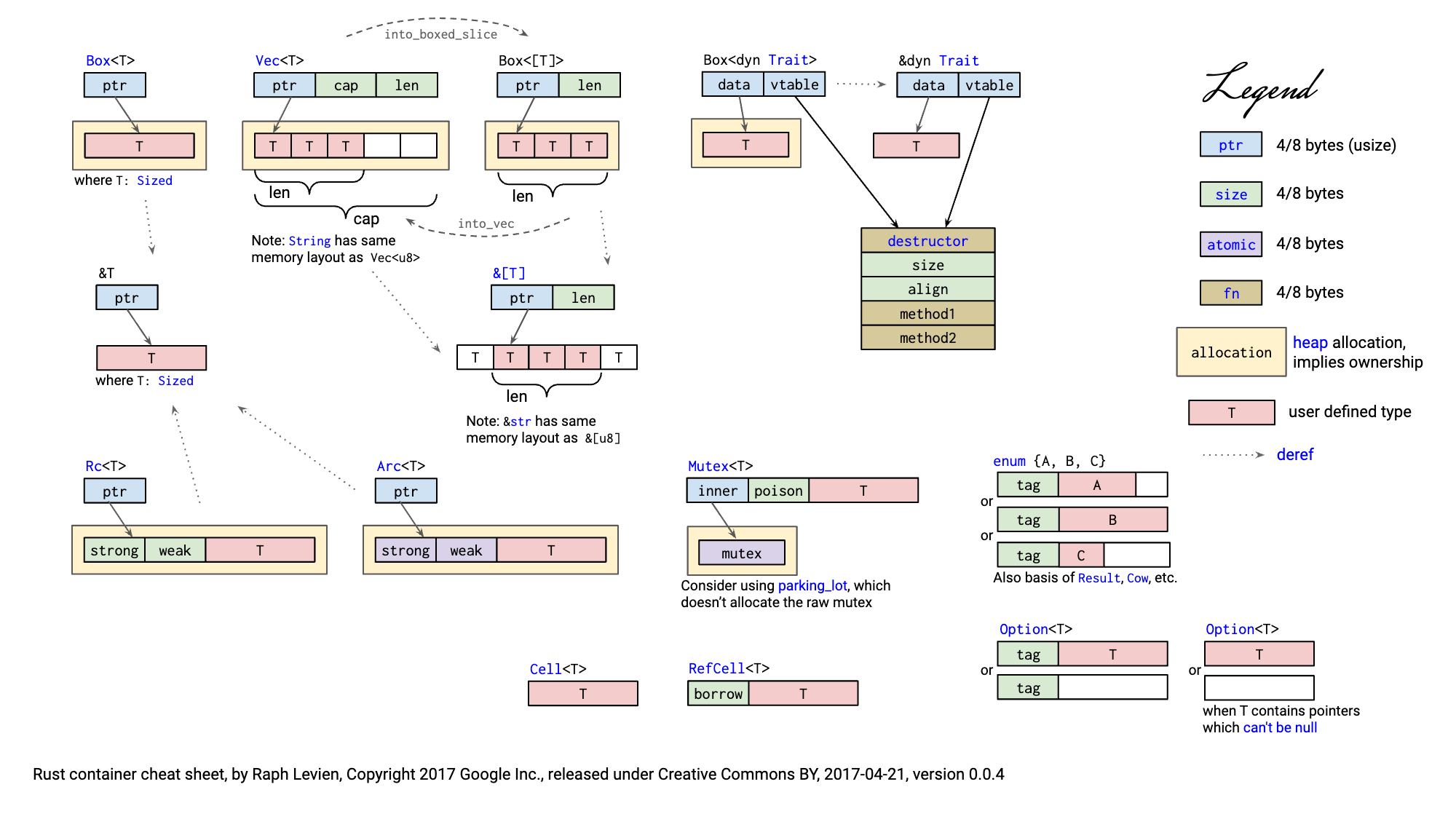what is rust
modern c language with solutions to existed problems.
basic knowledge stage
compile
rustcode -> tokens -> AST -> HIR -> MIR -> LLVMIR -> machine code
const, const fn <—> MIRi (interpreter)
|
|
数据类型
- 基本数据类型
- 数字 u8/f32
- 数组 [T:n]
- 字符 char
- 字符串 str
- 字面量
- 动态可增长字符串
- 从一段字符串中截取的片段
- 字符串编码
- FFI 中所需要转换字符串到 C 或 OS 本地字符串
- 遵循特定格式的文件路径
- slice [T]
- pointer
*const T - 引用 &T
- 引用不可能为空
- 拥有生命周期
- 受借用检查器保护, 不会发生悬垂指针问题
- 元组 (1,2,3)
- Unit ()
- Never !
- 函数指针 fn
- 自定义符合类型
- struct
- enum
- union
- 以枚举类型成员最大的对齐值为准, 不需要为每个枚举值都对齐
- 容器类型
- 泛型
- 特定类型
Std Traits
- Sync/Send
- Sized
- Default/Clone/Copy/Any
- Display/ToString/Debug
- PartialEq/Eq/Hash/PartialOrd/Ord
- Add/AddAssign
- FnOnce/FnMut/Fn
- Deref/DerefMut/Index/IndexMut/Drop
- From/Into
- Error
- TryFrom/TryInto/FromStr/AsRef/AsMut/Borrow/BorrowMut/ToOwned
- Iterator/IntoIterator/FromIterator
- Read/Write
函数与闭包
TODO: rewatch this chapter after understand ownership
|
|
闭包
- 未捕捉环境变量 - 所有权 ownership - FnOnce
- 捕捉且修改环境变量 - 可变借用 &mut T - FnMut
- 捕捉未修改环境变量 - 不可变借用 &T - Fn
闭包会自动实现部分 trait, 根据捕获的外界参数性质决定
- Sized
- Copy/Clone?
- Sync/Send
模式匹配
- let struct{x,y} = A
- let Some(y) = Some(3)
- match
- if let
- while let
- for let
smart pointers
impl Deref/Drop
- Box
|
|
strings
- unicode (u32)
- 4 byte
- convert to utf8
|
|
containers
Iter
for syntax sugar
|
|
module (crate)
- package 是概念的包, 包含了单个或多个 crate
- crate 是实际编译单元
- codegen-unit - crate 默认会被按 LLVM IR 切割成 16 份
|
|
action stage
ownership
let 绑定了变量与数据, 且指定了生命周期. let answer = 42;
- move 动态增长类型
- copy
- 默认存储数据在栈上
- 利用栈来自动管理堆内存

borrow check
thread & concurrent
the problem lock may bring
- performance (context switch, thread wait)
- dead lock
MESI (modified, exclusive, shared, invalid)
memory barrier (any operation before barrier happens before the operation after the barrier)
- load (read) memory barrier
- store (write) memory barrier
- full
memory order
- relaxed
- release
- acquire
- acqrel
- seqcst
trait
- interface
- mark
- trait bound
- trait object
- std::raw::TraidObject
- ObjectSafeValidation 需要满足对象安全限制
- enum 妙用
- Self::Sized
why Self::Sized?
- Self: Sized 为了保证 trait 默认实现内部的 Self 调用都是合法的。
- 防止函数体内包含了 Self 的默认实现混入虚表。因为虚表内 Self 无法确定。
error
- assert!
- Option
- Result
- panic
- abort/unwind
|
|
macro
any::TypeId 实现 class. Rust 应用每次启动, 都会给所有的类型生成不同的 typeId.
|
|
declarative macros
|
|
derive proc macro
- syn (syntax tree)
- quote
- proc-macro2 (token stream)
useful repo
unsafe
unsafe rust 不会提供安全检查的 五种操作
- 解引用指针
- 调用 unsafe 的函数
- 访问或修改可变静态变量
- 实现 unsafe trait
- 读写 union 联合体中的字段
PhantomData 引入安全检查
https://blog.logrocket.com/unsafe-rust-how-and-when-not-to-use-it/
async
async io model
epoll
epoll_create(int size)创建一个 epoll 数据结构, 返回一个 epfdepoll_ctl(int epfd, int op, int fd, struct epoll_event *event)新增监听或取消监听事件, 也可进行修改epoll_wait(int epfd, struct epoll_event *events, int maxevents, int timeout)阻塞等待注册事件发生, 返回事件数量, 将触发的事件写入 events 数组
两种触发机制
- LT 水平触发 - 缓冲区只要有数据就触发读写. epoll 默认工作模式
- ET 边缘触发 - 缓冲区空或满的状态才会触发读写. nginx 使用该方式, 避免频繁读写.
async models
-
event driven
-
futures
-
pin
-
async/await
-
https://github.com/zupzup/rust-epoll-example/blob/main/src/main.rs
异步运行时由外界提供, Rust语言本身并不关心
others
- future-rs
- smol
- async-std
- tokio
- rocket/actix-web/tower/hyper/warp